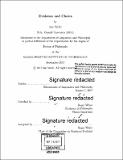| dc.contributor.advisor | Roger White. | en_US |
| dc.contributor.author | Wells, Ian (Ian T.) | en_US |
| dc.contributor.other | Massachusetts Institute of Technology. Department of Linguistics and Philosophy. | en_US |
| dc.date.accessioned | 2018-02-16T20:05:15Z | |
| dc.date.available | 2018-02-16T20:05:15Z | |
| dc.date.copyright | 2017 | en_US |
| dc.date.issued | 2017 | en_US |
| dc.identifier.uri | http://hdl.handle.net/1721.1/113773 | |
| dc.description | Thesis: Ph. D., Massachusetts Institute of Technology, Department of Linguistics and Philosophy, 2017. | en_US |
| dc.description | Cataloged from PDF version of thesis. | en_US |
| dc.description | Includes bibliographical references (pages 81-84). | en_US |
| dc.description.abstract | This dissertation defends causal decision theory and argues against its main rival, evidential decision theory. In Chapter 1, I introduce a decision problem in which evidentialists end up predictably worse off, on average, than causalists. This result is surprising since comparisons of average welfare have traditionally been taken to support evidential decision theory and undermine causal decision theory. In Chapter 2, Jack- Spencer and I give a new argument for one of causal decision theory's distinctive recommendations: two-boxing in Newcomb's problem. Unlike arguments based on causal dominance, our argument relies on a more basic principle connecting rational choice to guidance and actual value maximization. In Chapter 3, I take up the issue of rationalization. Is it possible to manipulate the demands of rationality in predictable ways? I argue that it is not. Then I show that if evidential decision theory is true, rationalization is not only possible but sometimes advisable. | en_US |
| dc.description.statementofresponsibility | by Ian Wells. | en_US |
| dc.format.extent | 84 pages | en_US |
| dc.language.iso | eng | en_US |
| dc.publisher | Massachusetts Institute of Technology | en_US |
| dc.rights | MIT theses are protected by copyright. They may be viewed, downloaded, or printed from this source but further reproduction or distribution in any format is prohibited without written permission. | en_US |
| dc.rights.uri | http://dspace.mit.edu/handle/1721.1/7582 | en_US |
| dc.subject | Linguistics and Philosophy. | en_US |
| dc.title | Evidence and choice | en_US |
| dc.type | Thesis | en_US |
| dc.description.degree | Ph. D. | en_US |
| dc.contributor.department | Massachusetts Institute of Technology. Department of Linguistics and Philosophy | |
| dc.identifier.oclc | 1022562223 | en_US |
